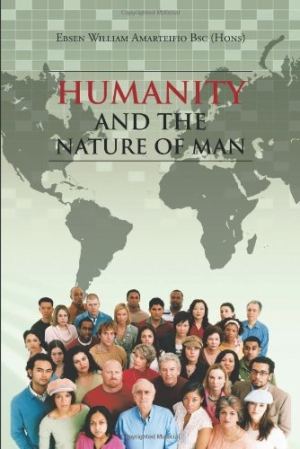Humanity and the Nature of Man
Want to help your fellow man? These meditations, essays, stories, and letters will inspire altruism.
Humanity and the Nature of Man is an eclectic collection of writings by a big-hearted man who focuses on the beneficent potential of the human race. This mélange includes stories, reminiscences, poems, letters, biographical sketches, essays, and descriptions of charitable foundations—all dedicated to the proposition that one can rise above selfishness and concentrate on helping others.
Author Ebsen William Amarteifio, a Ghanaian living in Britain, has worked as teacher, corporate manager, and registered mental nurse for the British National Health Service. He is the author of three previous books: You Can Win the Lott! (1996), Our Generation (1999), and What Has Food Got To Do With It, Anyway? (2011). Amarteifio confides that he was strongly influenced by his devout Methodist parents, especially his father, an avowed humanitarian in whose name the author is establishing the George A. Amarteifio Foundation.
The book can be read as a life-changing daily meditation on the topic of altruism. Different chapter lengths and varied genres keep things interesting. And the book need not be read in order of presentation; readers may pick and choose entries in any order. Amarteifio, certainly a Renaissance man, offers kernels of philosophy, history, and literature sufficient to pique the interest of people intrigued by humans’ multifaceted nature and the perennial good-versus-evil struggle.
The book includes an informative twelve-page essay on slavery and abolition as well as shorter pieces that can be difficult to follow because the author assumes readers’ knowledge of certain information (e.g., the Bible, history). He also includes a rather curious five-page play titled The Good Samaritan in Our Time. In it, a mugging victim delineates what was stolen from him: “My tablet, Apple, and Blackberry.” A bystander replies: “Is that all? Just some medication and some fruits? What is the world coming to?” Clearly, the author has a sense of humor.
Amarteifio’s descriptions of humanitarian role models include, among others, Nelson Mandela, Martin Luther King Jr., Mother Teresa, William Wilberforce, Harriet Tubman, and Oskar Schindler. The author also provides thumbnail sketches of philanthropic and charitable organizations such as Amnesty International, Doctors Without Borders, The Prison Reform Trust, and the Bill and Melinda Gates Foundation, as well as press reports of heroes who are “just folks.” For example, there’s twelve-year-old Charlie Doherty: “When Charlie, at the tender age of four, heard about the 2004 tsunami, he asked people to give to charity instead of giving him gifts.” In all, the boy raised in excess of £35,000 for charities by bicycling from Brighton, England, to Glasgow, Scotland, climbing Mount Snowdon, walking twenty-three miles, and visiting a school kitchen feeding hungry children in Malawi, Southern Africa—all before his voice had deepened.
Through such examples, Amarteifio instructs, encourages, and cajoles readers to sublimate their baser instincts. While additional editing could have produced a more polished final product, Humanity and the Nature of Man achieves its primary purpose: to inspire readers to think philanthropically, act altruistically, and be human.
Reviewed by
Nancy Walker
Disclosure: This article is not an endorsement, but a review. The publisher of this book provided free copies of the book and paid a small fee to have their book reviewed by a professional reviewer. Foreword Reviews and Clarion Reviews make no guarantee that the publisher will receive a positive review. Foreword Magazine, Inc. is disclosing this in accordance with the Federal Trade Commission’s 16 CFR, Part 255.

